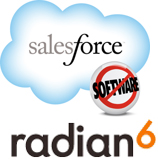Collaboration,Customer Communities,Enterprise 2.0,Online Customer Communities,Social Business,Social CRM

Social business has mainly been discussed in terms of what it can do for the company in terms of efficiency of Knowledge Management and Sharing and the impact it has on the organization and culture. One of the aspects of Social Business that so far is under-exposed is the positive (or negative…) impact on the way customers perceive the brand and thus the influence it has on their buying behavior. In this post I will briefly outline how Social Business and Brand Equity are related and help to reframe your thinking about Social Business and why it can be a sound market approach for your organization.
Social CRM,Traditional CRM Interaction
An interesting statistic caught my attention about customer interaction through Social Media; these interactions represent only 1% of company-customer interactions, and are expected to grow to 4% in five year’s time in France (Les Echos). In other words, 99% of interaction take place outside of Social Media! This to me leads to a very fundamental question about whether we are suffering from the Shiny Object Syndrome with regards to Social Media and customer engagement. Because we now have access to customers and prospects through these new channels, there is a real temptation to focus only on these without looking at why and how people are using these media in the first place, and where they fit into what I call the overall flow of getting to their desired outcomes.
customer experience, customer journey, featured, touchpoints TouchFlows

Forget all this talk about “Social Business”, “Social Enterprise”, “Social Organization”, “Social XYZ” – your business already is “Social” because by its very nature it consists of people interacting with each to get work done. Collaboration is already happening within your ecosystem – between employees, different departments, suppliers, channels, buyers, customers without the need to add the “Social” prefix. Adding the word by itself does bring attention to the idea that we need to change, but it is overly used (and has been hijacked) by certain vendors to mean the toolset rather than the mindset and thus risks diluting the message.
We’ve entered the final phase of this wild and lovely ride to choose the best up and coming CRM company – the one to keep and eye on both now and in the future! We now need YOUR help in deciding which company should be the 2011 CRM Idol and which will receive prizes ranging from “influencer consulting” to an opportunity to present to a Tier 1 Venture Capital Firm for possible investment.
So I suggest you go thru the videos one by one, read the company reviews and presentations, take notes and then cast your vote! The voting is open from October 24 through October 31, don’t for get to vote for both your favourite Amercia’s contestant as well as your EMEA one!

Implementing programmes that could potentially bring about profound changes in the way a company does business also entails that we need to deal with people issues such of putting a lot of strain and stress on those involved and lack of motivation – or risk the programme failing. In order for the programme to be successfully carried through and arrive at the results that we seek, we also need to ensure that everyone involved understands the need for change and adapts to a different way of working. In the following post Dr Graham Hill looks at what the drivers are that we can leverage to obtain the optimal outcome.
Dr Graham Hill, of Optima Partners enlightens us on why companies should shift their focus from producing for to creating value with customers – which is to optimize the value for all parties!

When it comes to providing customer support, service is in general provided at the lowest common denominator level regardless of whether the customer is a Rocket Scientist or a Poodle Walker. Segmentation and service differentiation based on customer capabilities could potentially help your organisation reach resolution faster and improve the customer experience at the same time.
During his keynote at the Social Business Forum Milan where I participated in a panel, Keith Swenson made the following very interesting observation: in business, the paradigm is moving from a Newtonian model (external observability, smoothness, simple rules, predictability) towards a Quantum model (limited precision, turbulence, relationship-based, unpredictability).
Analytics and Data Mining,Social CRM

It’s been a month since I attended Cloudforce in Paris, followed bythe Radian6 User Conference in Boston – so I thought it would be about time to gather my ideas and impressions and ‘commit them to paper’, so to speak. Especially in the light of the acquisition of the latter by the former just before the events. Salesforce clients in particular will stand to gain through the connection of social customer insights to the Sales and Service Clouds, by identifying new opportunities to engage with customers and to explore the customer’s context in order to facilitate service interactions.

Today I am honoured to host a guest post by Dr. Graham Hill, Partner, Optima Partners and Associate, DesignThinkers. Take it away Graham!
Too many customer experiences (CEx) are created just for the benefit of companies. Customer are either a target or an afterthought. Many customer experience practitioners don’t see the 900lb Gorilla in the room; the most important touchpoints are not about marketing, sales or service, but about the weeks, months, even years of product usage. Companies need to re-orient the customer experience around what customers’ value, the touchpoints they use to create it and how the company can benefit from co-creating more value together with customers. Doing this opens up new opportunities to earn revenues long after the point of sale.
Recent Comments